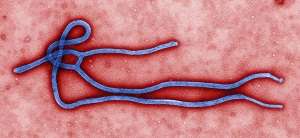 |
| Ebola virus under an electron microscope--Courtesy of CDC |
International debate is brewing over whether to give experimental vaccines to people in regions of the current Ebola outbreak in West Africa as part of an effort to thwart the deadly virus' spread.
In a recent Reuters article, Jeremy Farrar, a professor of tropical medicine and director of The Wellcome Trust charity, said the current standard of care for Ebola, which relies on supportive care, is "unacceptable." Farrar is advocating for the use of experimental vaccines and other investigational therapies to contain Ebola, which has so far caused 518 deaths with 844 confirmed cases, according to a July 8 update from the World Health Organization.
"It's ridiculous that we haven't got these [experimental] products out of labs and animal trials and into human testing, and at least offered to people," Farrar told Reuters.
Despite the severity of the disease, which causes hemorrhagic fever and kills up to 90% of its victims, some experts are urging against using experimental vaccines for safety reasons. There are no approved drugs to treat Ebola.
Dr. David Heymann, a professor of infectious diseases at the London School of Hygiene and Tropical Medicine and former assistant director at the WHO, told the Ottawa Citizen that it would be "unethical" to roll out experimental vaccines in at-risk populations in Africa now. Heymann was a member of the team that responded to the first Ebola outbreak in 1976.
One of the Ebola therapies in development--Tekmira Pharmaceuticals' ($TKMR) RNA interference therapeutic, which is intended to work by "silencing" disease-causing genes--has been placed on clinical hold by the FDA over safety concerns.
Tekmira's investigational drug is an RNAi therapeutic, not a vaccine. However, the few Ebola vaccines that in development are still in very early stages. Currently, Inovio Pharmaceuticals ($INO) and Vaxart are testing Ebola vaccines in animals, and last year GlaxoSmithKline ($GSK) acquired Swiss biotech Okairos, which has an Ebola vaccine in the preclinical phase.
The challenge with drug development for Ebola is the relatively low incentive for biotech and pharma companies. The virus is still rare, and has yet to spread outside Africa, although outbreaks have been increasing in frequency since Ebola was discovered in 1976.
- read the latest WHO update
- see the story from the Ottawa Citizen
- get more from Reuters